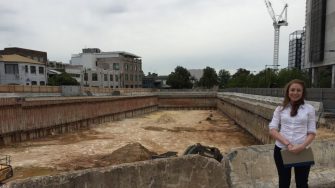
Isabel Duffy has worked at Northrop Consulting Engineers in Sydney since graduating from UNSW in 2012. As a structural engineer she is passionate about elegant and efficient structural design and injects this passion into her work designing complex concrete framed buildings with the specific intention of making them beautiful places where people can live, work and play.
As a keen advocate for the profession, she is highly motivated to make the industry more inclusive and chairs the National Young Engineers Australia committee.
What is a structural engineer?
Structural engineers design the bones of the building, so my job involves going through the calculations to work that skeleton out. Making sustainable and efficient decisions is a big part of my job too, so I think a lot about incorporating recycled materials and reducing wastage.
What’s the best thing about your job?
I get such a kick out of thinking laterally to bring ideas together to create the best kind of building.
Why did you want to become an engineer?
I love solving problems and figuring out how things come together. Combined with my interests in architecture, structural engineering seemed like the perfect fit. To be honest, I didn’t really know what engineering was until I was in year 12 – but then I heard another girl in my class talking about it and I was sold.
How do people benefit from the work that you do?
We all spend most of our lives in buildings and they shape a lot of our experiences. Having a great home, workplace, school, hospital etc. is important and front of mind for me as I work on creating these places for the next generations.
In the future, I’d like to work on buildings that help build community, like libraries and schools, because they contribute hugely to the happiness and wellbeing of the people who use them.
What is the most challenging project you’ve ever worked on?
I’m currently the lead structural engineer working on a 30-storey commercial tower in North Sydney. It’s in a high wind area and we’ve done a lot of work to make sure it doesn’t sway too much in a storm. The structure of the building is also imbalanced with the ‘core’ of the building on one side, so we’ve done a lot of analysis to make sure the building doesn’t tilt too much. High rise buildings are fascinating to work on – I’m already looking forward to my next one!
What do you see as one of the biggest issues facing the engineering profession?
We are currently in a state of emergency relating to climate change, and the engineering profession has a big role to play in stabilising this. Water and energy resources are two key areas where Australian engineers can make a big difference.
What are the most exciting opportunities for the future?
I’m excited to see where technology takes engineering in the future. As engineers we will be more valued for our design and creative problem-solving abilities as automation starts to take over the more mundane tasks. I also think our profession is becoming more human-focused with a lot of great solutions being developed around technology in the health space, for example.
